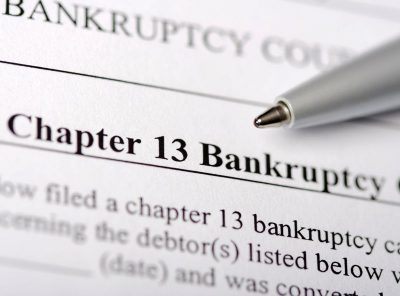- Lemberg Law
- Bankruptcy Law: Terms And Definitions
- FAQ About Bankruptcy
- What is Chapter 13 Bankruptcy?
Chapter 13 bankruptcy consists of an income-based repayment plan to restructure debt over three or five years. If you meet the payment requirements, remaining eligible debt will be discharged.

Can I File for Chapter 13 Bankruptcy?
Chapter 13 bankruptcy is available to those who have unsecured debts of less than $394,725 and secured debts of less than $1,184,200. Examples of unsecured debts are credit card debt and medical bills. Examples of secured debts are car loans and home mortgages. If your income is above the median income for a family of your size in your state, you are ineligible to file for Chapter 7 bankruptcy. Chapter 13 is your only option.
Even if you are eligible to file for Chapter 7 bankruptcy, you may still wish to file under Chapter 13. That’s because Chapter 7 involves liquidating all of your assets and paying off your creditors. Chapter 13 can allow you to keep some of your assets – or prevent a home foreclosure, for example – and give you time to get back on your feet without creditors hounding you.
What Happens When You File Chapter 13?
When you file for Chapter 13, or within two weeks of filing, you are required to submit a proposed payment plan to the court based on your calculated disposable income. Although the court won’t have approved the plan, you must begin making payments to the appointed trustee within 30 days.
All debts are not equal when it comes to Chapter 13. There are priority debts, such as taxes. There are secured debts, for which property is used as collateral. And there are unsecured debts. Each type of debt is treated differently. Priority claims must be completely repaid. If you want to keep the property – like your car or house – associated with the secured debt, you’re required to pay the creditor the value of the property. For mortgages, you can agree to the original length of the mortgage, but you have to make up any back payments over the term of the repayment plan. Unsecured debts will be discharged – wiped out – at the end of the payment plan if you have made all of the required payments and have attended a financial management program.
What are the Benchmarks in Chapter 13?
There are a number of benchmarks to the Chapter 13 process. For example, a meeting of creditors is held, during which you are required to answer questions under oath about your finances and the repayment plan. Within 45 days of that meeting, the bankruptcy court will rule on your repayment plan. If the court confirms the plan, then the trustee will begin to pay the creditors. If the court doesn’t confirm the plan, you’ll have the opportunity to submit a revised plan.
The length of the payment plan depends upon your income. If it exceeds your state’s median income for a family of your size, then the payment plan is for five years. If your income meets or is less than your state’s median income, then your payment plan will last for three years. During this time, you’re not allowed to incur any additional debt without first getting the permission of your trustee.
Chapter 13 bankruptcy can give you peace of mind while you work on regaining your financial well-being. The process of filing and receiving approval for bankruptcy is exceedingly complex, though, so it is very helpful to have a bankruptcy attorney guide you through the process.
Have questions? Call us now at 855-301-2100 for a Free Case Evaluation.
Our services are absolutely FREE to you.
The harassing company pays our fees.